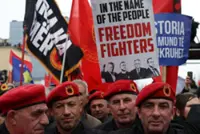EIGHTY years ago this month, the Germans surrendered unconditionally to the Allied Forces.
On May 4, King Charles of England began a four-day commemoration of that event. It seemed like an ironic anniversary celebration from the perspective of South Asia where we were poised on the brink of a large-scale war between India and Pakistan.





